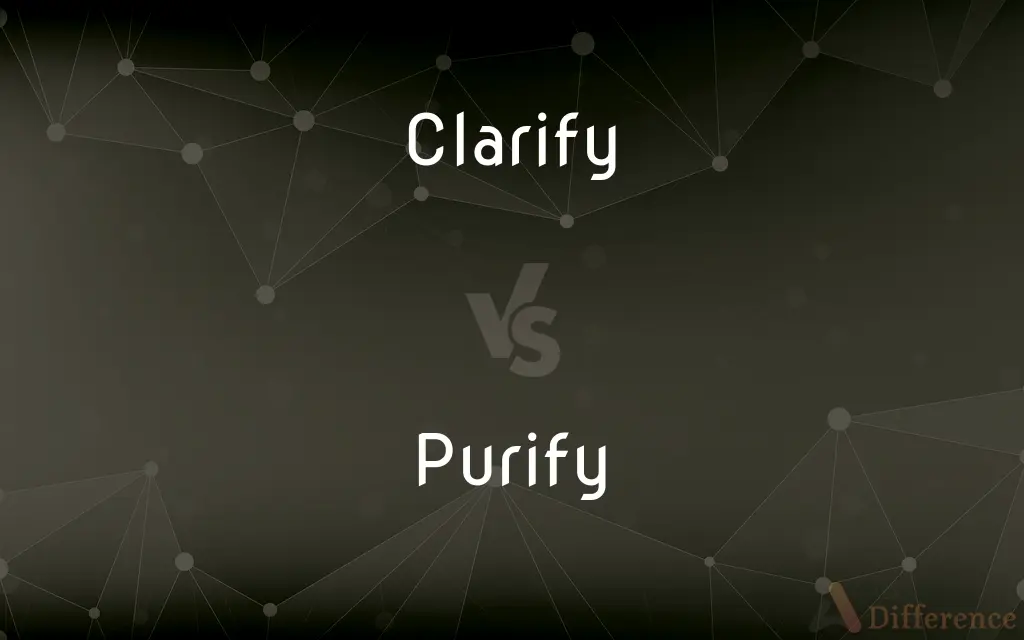Clarify vs. Purify — What's the Difference?
By Fiza Rafique & Maham Liaqat — Updated on April 1, 2024
Clarify involves making something easier to understand by explaining it more clearly, while purify means removing impurities or contaminants to make something pure.

Difference Between Clarify and Purify
Table of Contents
ADVERTISEMENT
Key Differences
Clarifying something often involves explaining or elaborating on a subject to make it easier to understand. This could be done through examples, definitions, or simplification of complex ideas. On the other hand, purifying something focuses on the physical or moral cleansing of substances, objects, or even thoughts, removing anything that is considered impure or harmful.
Clarification can be applied in various contexts, such as clarifying a statement, a concept in a lesson, or instructions in a manual, ensuring the message is clear and comprehensible. Whereas purifying is commonly associated with processes like filtering water, refining metals, or spiritual cleansing, aiming to restore purity and original essence.
In the realm of communication, to clarify is to eliminate misunderstandings, making ideas or messages more transparent and accessible to the audience. Meanwhile, purifying does not relate to communication but to the act of making an environment, substance, or soul free from pollutants, toxins, or negative influences.
Clarifying is a crucial skill in teaching, writing, and any form of effective communication, aiming to make information more accessible. In contrast, purifying is a process or method used in both scientific and spiritual practices to ensure cleanliness, wholesomeness, or sanctity.
While clarification seeks to enhance understanding and eliminate ambiguity by providing clear explanations, purification is concerned with achieving a state of purity, whether it be in water, air, or ethical conduct, through the removal of undesirable elements.
ADVERTISEMENT
Comparison Chart
Definition
To make clear or easier to understand by explaining
To remove impurities or contaminants
Context
Often used in communication and teaching
Commonly used in scientific, environmental, and spiritual contexts
Objective
Enhance understanding and reduce ambiguity
Achieve cleanliness or purity
Process
Involves explanation, definition, or illustration
Involves filtering, cleansing, or refining
Application
Statements, concepts, instructions
Water, air, substances, moral/ethical cleansing
Compare with Definitions
Clarify
To remove doubt.
He clarified his position on the matter during the meeting.
Purify
To refine a substance to increase its purity.
The process is designed to purify the air in the room.
Clarify
To explain a concept more thoroughly.
Can you clarify what you mean by 'sustainable practices'?
Purify
To remove contaminants from a substance.
The new filter can purify water from the lake.
Clarify
To make a statement or instruction clearer.
The teacher clarified the homework assignment by giving an example.
Purify
To make something spiritually or morally clean.
The ritual is believed to purify the soul.
Clarify
To elucidate a misunderstanding.
She called to clarify the misunderstanding about the invoice.
Purify
To cleanse something of impurities.
They used charcoal to purify the polluted water.
Clarify
To make less confused and more clearly comprehensible.
The diagram helped to clarify the complex process.
Purify
To clear of guilt or moral blemish.
Seeking forgiveness was his way to purify his conscience.
Clarify
Make (a statement or situation) less confused and more comprehensible
The report managed to clarify the government's position
Purify
To rid of impurities
Purify water.
Clarify
Melt (butter) in order to separate out the impurities
Seal the pots with a layer of clarified butter
Purify
To rid of foreign or objectionable elements
Tried to purify the party of its dissenters.
Clarify
To make clear or easier to understand; elucidate
Clarified her intentions.
Purify
To free from moral or spiritual defilement
Rituals to purify the soul.
Clarify
To clear of confusion or uncertainty
Clarify the mind.
Purify
(transitive) To cleanse, or rid of impurities.
Clarify
To make clear by removing impurities or solid matter, as by heating gently or filtering
Clarify butter.
Purify
(transitive) To free from guilt or sin.
Clarify
To become clear.
Purify
(intransitive) To become pure.
Clarify
(of liquids, such as wine or syrup) To make clear or bright by freeing from feculent matter.
Purify
Hence, in figurative uses: (a) To free from guilt or moral defilement; as, to purify the heart.
And fit them soPurified to receive him pure.
Clarify
To make clear or easily understood; to explain in order to remove doubt or obscurity.
Purify
To free from improprieties or barbarisms; as, to purify a language.
Clarify
(ergative) To grow or become clear or transparent; to become free from feculent impurities, as wine or other liquid under clarification.
Leave the wine for 24 hours and it will clarify.
Purify
To grow or become pure or clear.
Clarify
(ergative) To grow clear or bright; to clear up.
Purify
Remove impurities from, increase the concentration of, and separate through the process of distillation;
Purify the water
Clarify
(obsolete) To glorify.
Purify
Make pure or free from sin or guilt;
He left the monastery purified
Clarify
To make clear or bright by freeing from feculent matter; to defecate; to fine; - said of liquids, as wine or sirup.
Purify
Become clean or pure or free of guilt and sin;
The hippies came to the ashram in order to purify
Clarify
To make clear; to free from obscurities; to brighten or illuminate.
To clarify his reason, and to rectify his will.
Clarify
To glorify.
Fadir, clarifie thi name.
Clarify
To grow or become clear or transparent; to become free from feculent impurities, as wine or other liquid under clarification.
Clarify
To grow clear or bright; to clear up.
Whosoever hath his mind fraught with many thoughts, his wits and understanding do clarify and break up in the discoursing with another.
Clarify
Make clear by removing impurities or solids, as by heating;
Clarify the butter
Clarify beer
Common Curiosities
How does purifying water work?
Purifying water involves removing contaminants and impurities through various methods like filtration, distillation, or chemical treatment to make it safe for drinking.
Can you clarify concepts in any field?
Yes, clarifying concepts can apply to any field or subject by providing explanations, definitions, or examples to make the information more comprehensible.
Is purifying always about physical substances?
While often associated with physical substances, purifying can also refer to moral or spiritual cleansing, removing negative or impure thoughts and actions.
What are common methods of purification?
Common methods include filtration, distillation, chemical treatment, and boiling, depending on the context and substance being purified.
Why is clarification important in teaching?
It ensures students understand concepts clearly, aiding their learning process and preventing misconceptions.
Does clarifying involve changing the original message?
Clarifying does not change the original message but makes it more understandable by providing additional information or context.
What does it mean to clarify something?
To clarify something means to make it clearer or easier to understand through explanation or additional information.
Can purifying affect the taste of water?
Yes, purifying water can affect its taste by removing contaminants and minerals, sometimes making it taste cleaner or, in some cases, bland.
How important is clarification in communication?
Clarification is crucial in communication to ensure messages are understood correctly, preventing misunderstandings and confusion.
Is clarification only verbal?
Clarification can be verbal or written, using explanations, diagrams, or examples to make information clearer.
How does purifying air benefit health?
It removes pollutants and allergens, improving air quality and reducing the risk of respiratory issues.
What role does purification play in environmental conservation?
Purification processes are vital in treating wastewater, reducing pollution, and ensuring ecosystems are protected from harmful substances.
Can purification be a spiritual practice?
Yes, many cultures and religions include purification rituals for spiritual cleansing and renewal.
What is the significance of purifying in science?
In science, purifying substances is essential for experiments and applications that require materials of specific purity levels for accuracy and safety.
Can clarification help in resolving conflicts?
Yes, by clarifying misunderstandings or miscommunications, conflicts can often be resolved or mitigated.
Share Your Discovery

Previous Comparison
Catch vs. Busted
Next Comparison
Schedule vs. RosterAuthor Spotlight
Written by
Fiza RafiqueFiza Rafique is a skilled content writer at AskDifference.com, where she meticulously refines and enhances written pieces. Drawing from her vast editorial expertise, Fiza ensures clarity, accuracy, and precision in every article. Passionate about language, she continually seeks to elevate the quality of content for readers worldwide.
Co-written by
Maham Liaqat













































